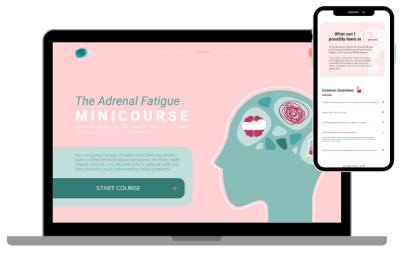Who’s Most Vulnerable to Adrenal Burnout?
Adrenal burnout is the direct consequence of an overburdened stress response system. Stress is an inevitable fact of life. But certain personality traits can make an individual more sensitive to the toll of stress. With time, the overload leads to adrenal burnout, which is sometimes called Adrenal Fatigue.
In my past 20 years of focus on Adrenal Fatigue, I’ve discovered that while no two patients are the same, most of them share more than half of the following characteristics.
8 Personality Types Linked to Adrenal Burnout:
#1 Type-A Personality
Many adrenal burnout patients are “Type-A” personalities. They are usually focused and detail-oriented, and they are driven to get tasks done meticulously.
They can be perfectionists and overachievers, which is exactly why type-A people are highly susceptible to adrenal burnout.
Type-A characters are self-confident and renowned for their achievements. They have a strong sense of self and set themselves up for success.
However, life always comes with a lot of curveballs, and when things don’t pan out exactly as they planned, Type-A personalities get stressed out. This makes a multifaceted life difficult to handle, whether the frustration comes from work, family, friends, or other daily activities.
Research has also linked this personality type to above-average intelligence. No amount of intelligence, however, can make a person immune from feeling overwhelmed. In fact, it can often lead to more frustration when things inevitably don’t turn out perfectly.
#2 Self-Motivated
Another trait that contributes to Adrenal Fatigue or adrenal burnout is a strong drive or self-motivation. When we have these drives, they can have an impact on our health, emotions, and productivity levels.
Just like anything else in life, too much of anything, including motivation, can have negative results. It means putting too much pressure on yourself and toward achieving your goals. Too much pressure equates to stress that can trigger Adrenal Fatigue, or adrenal burnout.
#3 Overthinkers
Adrenal burnout patients are often overthinkers. This is somewhat connected to the worry and fear they feel on a daily basis. They develop a drive to overthink as a way to exert control over their environment or to find meaning in their life.
When one’s brain is constantly working and doesn’t rest when and how it should, it can lead to emotional distress. Some overthinkers resort to unhealthy coping strategies, like alcohol, food, or addictive substances. This leads to a negative mood, anger, and irritability.
Other physical effects of overthinking are poor sleep quality and increased heart rate. People who overthink are more likely to experience stress-related illnesses, like adrenal burnout.
The real key to overcoming stress lies somewhere between awareness and conscious decision making. Overthinkers must learn to channel their energy into effective strategies to manage responsibilities.
Finding tools to control repetitive thoughts or ruminating can help overthinkers garner an attitude of mindfulness.
#4: Sensitive Souls
Adrenal burnout patients are generally sensitive souls. They are often told that they’re “too sensitive.”
Dr. Thomas Bryce often speaks of a personality called “the orchid child,” in which a person shows great sensitivity and susceptibility to both bad and good environments.
Orchid children are delicate and sensitive beings who are more easily affected by everything around them. This means they should take great care to learn how to manage stress and avoid unnecessary stressors.
Adrenal burnout and emotional sensitivity go hand in hand. When people with adrenal burnout are inevitably told they’re too sensitive and shouldn’t take things so personally, they often get only more stressed out.
Learn what’s really going on with your body and why you’re still experiencing symptoms…despite all your attempts to get better.
Learn what’s really going on with your body and why you’re still experiencing symptoms…despite all your attempts to get better.
#5 Empathetic
Adrenal burnout patients often play the caregiver role among friends and family. They are empathetic, almost to a fault. And this takes its toll.
People with adrenal burnout feel like they have to be the caring person all the time, because taking care of others can be very rewarding. Since caregiving is often a long-term challenge, the emotional impact can snowball over time.
Having an empathetic nature can involve many stressors, sometimes leading to self-neglect. If the stress of caregiving is left unchecked, it can affect your health, relationships, and state of mind, which eventually leads to adrenal burnout.
When someone is stressed, they are less able to provide for and protect others. This leads caregivers to isolate themselves from their own needs and feelings because they worry about upsetting or abandoning the person they care about.
To reverse adrenal burnout, one needs to redirect their expressions of care and compassion towards themselves.
Taking care of oneself isn’t a luxury; it’s a necessity. Cultivating one’s emotional and physical well-being is just as important as making sure one’s family or friends get the care they need.
#6 Trauma Survivors
Adrenal burnout patients have usually suffered a significant amount of trauma, whether they’ve undergone emotional or physical abuse or experienced a traumatic event.
Trauma has a severe impact on our bodies because of the way it affects and ultimately rewires the brain. When the brain goes into trauma mode, it leads to a complicated ripple of health-altering symptoms.
Many patients I’ve seen often have a difficult time “disassociating ” themselves from that stress. The brain automatically stores one’s experiences into a form of memory. However, there are times when your brain “walls off” a memory of a traumatic experience for its own good.
And when trauma gets sealed in the long-term memory, a severe and more chronic form of dissociation happens. Traumatic memories become isolated from context and simmer in the brain and body.
#7 The Fear of Being Thought of as Lazy
Adrenal burnout patients cringe at the thought of their coworkers and loved ones believing they are helpless or have simply “given up” on living a fully functional life.
This fear is deeply-laden, for years, and has pushed them to continuously work harder and take less time for their own wellbeing.
The belief that taking time off is a sign of laziness has seeped into many cultures. And the “hustle culture,” which has become the norm, has prevented us from getting the quality rest that we need.
It happens to the best of us. We fear getting criticized, so we choose not to take time off. And sometimes we push ourselves too far and pressure ourselves to achieve unrealistic results.
Putting pressure upon ourselves to function beyond our capacity causes stress that leads to adrenal burnout. Adrenal patients need to remember that making more time for their own wellbeing is essential for healing.
Taking time off is not a sign of laziness and weakness, but of self-preservation.
#8 Depression or Anxiety Diagnosis
Many patients suffering from adrenal burnout turn to antidepressant and anti-anxiety pharmaceuticals out of desperation. Even if they know it’s not the true solution, people with adrenal burnout often think transient relief is better than having no relief at all.
Until recently, adrenal burnout was not something many people openly talk about. It is an ongoing stress reaction that can lead to a variety of symptoms, including depression and anxiety.
We can easily tell the difference between a depressed person and a patient with adrenal burnout with one question: “What would you do if you felt better?”
A clinically depressed person will most likely have no idea. The adrenal burnout patient will have a list of several goals, sometimes dozens. They’re just too exhausted to accomplish them.
What Is Adrenal Burnout?
Simply put, adrenal burnout, or Adrenal Fatigue, is a weakening of one’s stress response system. It affects the patient body-wide and manifests in various conditions, factors which have made it so tricky to pinpoint in the past.
Stress hormones are incredibly damaging when they are triggered over and over. The more they’re triggered, the more sensitive they become. Even little things, like sitting in traffic or eating something one’s body doesn’t like, can set off the stress response system.
It’s important to take time to slow down and address the root of this issue to reverse adrenal burnout. Since every person’s mind and body react differently to adrenal burnout, it’s best to seek an individualized treatment plan. I do this using my Trilateral Approach to Healing.





















